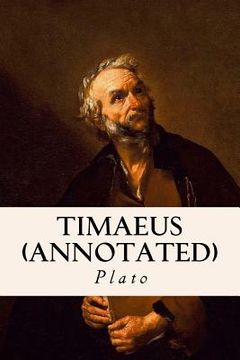Reseña del libro "Timaeus (annotated) (en Inglés)"
Timaeus is one of Plato's dialogues, mostly in the form of a long monologue given by the title character Timaeus of Locri, written c. 360 BC. The work puts forward speculation on the nature of the physical world and human beings and is followed by the dialogue Critias. Participants in the dialogue include Socrates, Timaeus, Hermocrates, and Critias. Some scholars believe that it is not the Critias of the Thirty Tyrants who is appearing in this dialogue, but his grandfather, who is also named Critias. It has been suggested that Timaeus influenced a book about Pythagoras, written by Philolaus. The dialogue takes place the day after Socrates described his ideal state. In Plato's works such a discussion occurs in the Republic. Socrates feels that his description of the ideal state wasn't sufficient for the purposes of entertainment and that "I would be glad to hear some account of it engaging in transactions with other states" (19b). Hermocrates wishes to oblige Socrates and mentions that Critias knows just the account (20b) to do so. Critias proceeds to tell the story of Solon's journey to Egypt where he hears the story of Atlantis, and how Athens used to be an ideal state that subsequently waged war against Atlantis (25a). Critias believes that he is getting ahead of himself, and mentions that Timaeus will tell part of the account from the origin of the universe to man. Timaeus begins with a distinction between the physical world, and the eternal world. The physical one is the world which changes and perishes: therefore it is the object of opinion and unreasoned sensation. The eternal one never changes: therefore it is apprehended by reason (28a). The speeches about the two worlds are conditioned by the different nature of their objects. Indeed, "a description of what is changeless, fixed and clearly intelligible will be changeless and fixed," (29b), while a description of what changes and is likely, will also change and be just likely. "As being is to becoming, so is truth to belief" (29c). Therefore, in a description of the physical world, one "should not look for anything more than a likely story" (29d). Timaeus suggests that since nothing "becomes or changes" without cause, then the cause of the universe must be a demiurge or a god, a figure Timaeus refers to as the father and maker of the universe. And since the universe is fair, the demiurge must have looked to the eternal model to make it, and not to the perishable one (29a). Hence, using the eternal and perfect world of "forms" or ideals as a template, he set about creating our world, which formerly only existed in a state of disorder. Timaeus continues with an explanation of the creation of the universe, which he ascribes to the handiwork of a divine craftsman. The demiurge, being good, wanted there to be as much good as was the world. The demiurge is said to bring order out of substance by imitating an unchanging and eternal model (paradigm). The ananke, often translated as 'necessity', was the only other co-existent element or presence in Plato's cosmogony. Later Platonists clarified that the eternal model existed in the mind of the Demiurge. Timaeus describes the substance as a lack of homogeneity or balance, in which the four elements (earth, air, fire and water) were shapeless, mixed and in constant motion. Considering that order is favourable over disorder, the essential act of the creator was to bring order and clarity to this substance. Therefore, all the properties of the world are to be explained by the demiurge's choice of what is fair and good; or, the idea of a dichotomy between good and evil. First of all, the world is a living creature. Since the unintelligent creatures are in their appearance less fair than intelligent creatures, and since intelligence needs to be settled in a soul, the demiurge "put intelligence in soul, and soul in body" in order to make a living and intelligent whole.

